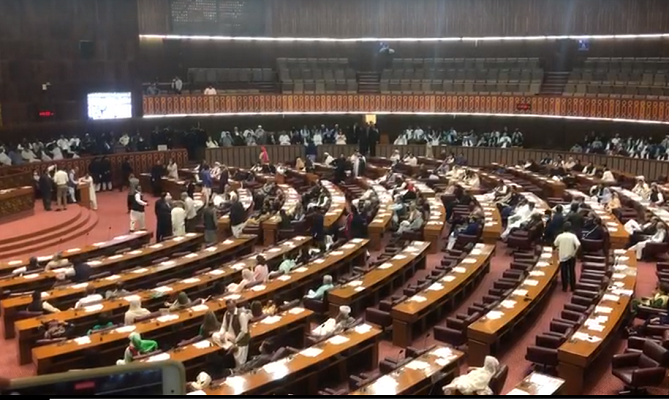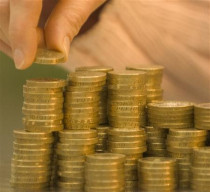
In a move that belies Prime Minister Shehbaz Sharif’s claim of putting burden on the privileged class, the government has proposed to empower the National Assembly speaker and Senate chairman to grant themselves and the past custodians of parliament additional privileges.
The amendment to the Chairman and Speaker (Salaries, Allowances and Privileges) Act 1975 has been proposed through the Finance Act 2022 that the National Assembly will likely take up for approval on Wednesday.
The government has also made some other sweeping changes to the Finance Bill that it presented on June 10.
It has proposed in the bill that “The Finance Committee of the Senate or National Assembly, as the case may be, may grant to the Chairman or the Speaker including a person who has held such office after election thereto, such additional privileges as it may deem fit from time to time.”
Under the existing law, such additional privileges are granted by the federal government to the Senate chairman and the National Assembly speaker.
The amendment will allow the custodians of both the houses to quietly increase their privileges without the approval of the federal cabinet.
Prime Minister Shehbaz Sharif takes pride in putting burden on the country’s ultra-rich but at the same time his government’s few actions could create unease among the masses who are exposed to double-digit inflation and reduction in the purchasing power.
Usually, the finance committees of both houses are chaired by the Speaker and the Senate chairman and giving such powers to them would be a clear case of conflict of interest.
Despite opposition by the Law Division, the government has brought amendments to the Export Development Fund Act 1999 through the Finance Act 2022.
The fund law does not strictly fall in the ambit of the money bill and requires amendments from both houses of parliament. Through the amendment, the government has proposed to set up the Export Development Fund, which will be non-lapsable.
Income tax
Through the Finance Act 2022, the government has allowed to carry forward the losses against turnover tax for three years, accepting a major demand of the business community. In the budget, the government had withdrawn this facility to collect Rs40 billion additional taxes a year.
The government did not withdraw the Rs8 billion tax relief to the stock market and instead linked the benefits to the securities purchased for tax year 2023 and onwards. In the budget, it had proposed this relief which the Prime Minister subsequently ordered to withdraw but it still remains part of the Bill to be laid in the National Assembly today.
The government has given income tax exemption to Burhani Qarzan Hasnan Trust, Saifee Hospital Karachi and Saifiyah Girls taalim Trust.
The government has relaxed the disclosure condition about the ultimate owners of Pakistani companies to ward off pressure from the wealthiest people, who were reluctant to fully reveal their assets and want the continuation of secrecy. Against the proposed requirement that companies will have to disclose the names of their ultimate owners who directly or indirectly control at least 10% shares or voting rights, the government has lowered the requirement to 25% of the shareholding.
The government has changed the definition of resident Pakistani to include all those people in the tax net who do not stay in any foreign country for more than six months. “Being a citizen of Pakistan is not present in any other country for more than one hundred and eighty-two days during the tax year or who is not a resident taxpayer of any other country”, according to the Bill.
According to an amendment in the section 111 that deals with unexplained income, it has been proposed that where a taxpayer, while explaining the nature and source of any amount takes into account any source of income which is subject to final tax under any provision of the Ordinance, the taxpayer shall not be entitled to take credit of any sum as is in excess of imputable income, unless the excess amount is reasonably attributed to the business activities subject to final tax.
Super tax sectors
The government has proposed the super tax from tax year 2022 and onwards for the following sectors, according to Bill.
The sectors that will be subject to 10% tax are airlines, automobiles, beverages, cement, chemicals, cigarette and tobacco, fertilizer, iron and steel, LNG terminal, oil marketing, oil refining, petroleum and gas exploration and production, pharmaceuticals, sugar and textiles. Prime Minister said on Tuesday that the corporate sector has largely accepted the super tax.
The banks will be subject to the 10% super tax from tax year 2023.
The government has also reduced the proposed 2% capital value tax on vehicles besides omitting the taxable limit of Rs5 million value of the car. It has proposed 1% CVT on all cars of 1,300 cc and above.
The government has further amended the clause introduced on June 10 to collect tax on the deemed income from properties. The government will treat these immovable assets as capital assets to avoid legal complications.
The proposed changes exclude any capital asset or property owned by the resident person from the deemed income tax. The agricultural land has also been excluded from the tax, except farm houses.
Any constructed property in respect of which the completion certificate has been obtained from the concerned authority will also be excluded from the levy.
The government has again reduced the limit of expenditure that can be made without digital mode but eligible for tax allowance from Rs1 million to Rs250,000. However, it has reduced the disallowance of expenditure from 10% to 8%.
The government has restored the income tax exemption on contribution to the pension funds for both companies and individuals.
The government has extended the tax credit to the charitable organizations for one year, as against earlier proposal of two years, covered under section 100C.
Sales Tax
The government has also imposed 1% GST on Manufacture or import of substances registered as drugs under the Drugs Act, 1976 and also 1% on Active Pharmaceutical Ingredients, excluding excipients, for manufacture of drugs registered under the Drugs Act, 1976 or raw materials for the basic manufacture of pharmaceutical active ingredients. Earlier, these sectors had been brought in zero rating regime, which resulted into blockage of Rs40 billion refunds.
The government has also restored the existing sales tax rates on import of mobiles in the CKD kits form. The government has imposed Rs700 per metric tons GST on coal –increasing it from Rs425.
The government has proposed to exclude jewelers doing business in less than 300 square feet shop from standard sales tax and they will now be charged at Rs40,000 fixed tax to cover their all tax related liabilities.
It has proposed 3% tax on sale of jewelry 12.5% on sale of electric vehicle in CBU condition of 50 kv battery or below and 1% on electric vehicle transport buses of 25 seats or more in CBU form. The
It has also proposed that the fixed sales tax rates of Rs3,000 to Rs10,000 will be doubled for those retailers whose names are not appearing in the Active Taxpayers List issued by the Board under the Income Tax Ordinance, 2001 on the date of issuance of monthly electricity bill.
The government has proposed abolishing 17% GST on the retail price of the fertilizer and exempted it from the tax. The sales tax exemption for oil cake and solid residue has also been restored.
The government has restored zero rating on local supplies of raw materials, components, part and plant and machinery to registered exporters authorized under Export Facilitation Scheme, 2021 notified by the Board with such conditions, limitations and restrictions as specified therein.
Customs duty
The government has withdrawn the decision that the collector can impose port charges –which was otherwise the domain of the Ministry for Maritime Affairs. The government has increased custom duties on import of Synthetic organic products of a kind used as fluorescent brightening agents from 16% to 20% and on Acid dyes, direct and reactive dyes from 11% to 16%.

1724657897-0/Untitled-design-(2)1724657897-0-405x300.webp)








1731884290-0/image-(9)1731884290-0-270x192.webp)







COMMENTS (1)
Comments are moderated and generally will be posted if they are on-topic and not abusive.
For more information, please see our Comments FAQ